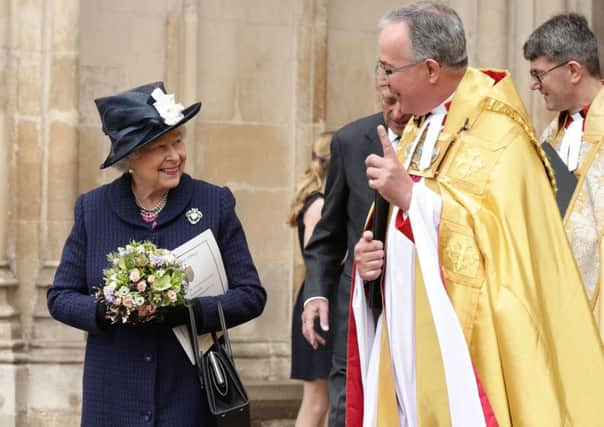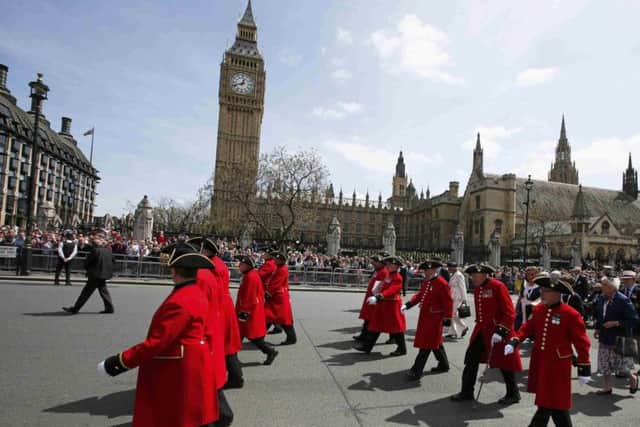Royals mark VE Day anniversary


Following a service of thanksgiving at Westminster Abbey, to remember those who had sacrificed their lives, the Queen was introduced to Second World Veterans including Eric Buckley, who served in the Royal Navy as an engineer aboard Motor Torpedo boats during the D-Day landings in Normandy.
The 89-year-old, from Leicestershire, said he was serving in the Netherlands on VE Day and celebrated by drinking rum.
Advertisement
Hide AdAdvertisement
Hide Ad“The Dutch people came to us with drink. It was a really good day,” he said.


The Queen also met Barbara Weatherill, 89, from Selby, who served as a driver with the anti-aircraft command in the Royal Artillery during the Second World War.
She said: “There’s not many left of us now. We tell it as it was so future generations will know.
“It’s so easy to slip into war. People have tempers. People never seem to learn unfortunately.”
Advertisement
Hide AdAdvertisement
Hide AdThe Queen, Duke of Edinburgh, Prince of Wales and other senior royals attended today’s service, together with Prime Minister, David Cameron and members of the Armed Forces and representatives of the Allied nations and Commonwealth countries that fought alongside Britain. Around a 1,000 military veterans also attended.
Addressing the congregation, Archbishop of Canterbury Justin Welby said: “We gather again, 70 years on, thankful for victory over the greatest darkness of the 20th century, perhaps of all history.
“Our gratitude is not simply for victory-in-Europe, but also reconciliation-in-Europe that followed, neither obviously or automatically.
“The peace for which we give thanks today - 70 years of the greatest peace in Western Europe since the departure of the Roman legions - remains an ongoing project of reconciliation, not only for us but as a gift to the world, where conflict and extremism destroy hope, devastate prosperity, vanquish aspiration to a better life.”
Advertisement
Hide AdAdvertisement
Hide AdToday was the final day of events being held to mark the anniversary, seven decades after the announcement that Germany had offered the unconditional surrender to the Allies that brought about the end of the war in Europe on May 8, 1945.
More than 580,000 members of the UK and Commonwealth forces lost their lives, along with 67,073 British civilians, during six years of conflict.
After entering the abbey, the Queen touched a wreath which was laid at the Grave of the Unknown Warrior before she took her seat with the Duke, Charles and the Duchess of Cornwall and other senior Royals. Others attending included Foreign Secretary Philip Hammond, Home Secretary Theresa May and Defence Secretary Michael Fallon.
One thousand military veterans joined a parade of bands and current servicemen and women as they made their way from the abbey along Whitehall - past the balcony where Sir Winston Churchill made an historic speech before vast crowds.
Advertisement
Hide AdAdvertisement
Hide AdAt Horse Guards Parade, Charles and Camilla watched a fly-past by the Red Arrows and aircraft that helped Britain and her Allies win the war - the Lancaster bomber and Spitfire and Hurricane fighters.
Charles and Camilla arrived at St James’s Park in London to meet Second World War veterans who were enjoying a picnic-style lunch hosted by the Royal British Legion.
The royal couple went into separate marques where the former servicemen and women were being treated to ham and mustard sandwiches, mint raised pork pies, lemon drizzle cake and strawberry trifle.
The Prince, wearing eight medals, was introduced to 93-year-old Stephen Kowalski who fled Poland to Italy in 1940 before serving with the Polish army under British command during the Second World War.
Advertisement
Hide AdAdvertisement
Hide AdMr Kowalski said: “I told (Charles) I was in the Polish army and he said the Poles are still coming here and they are hard-working.”
His daughter Helena added: “He said he didn’t know what we would do without them.”